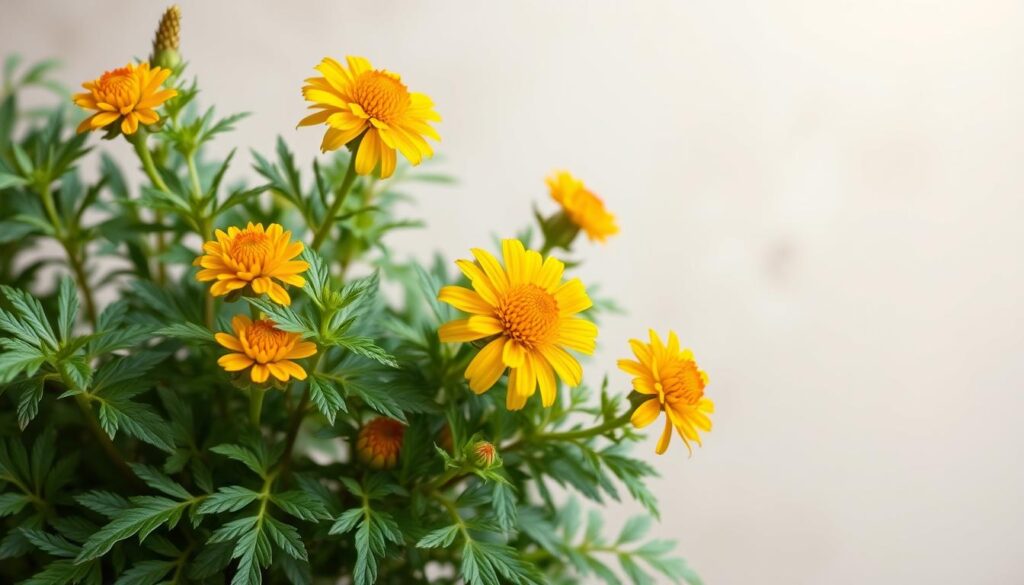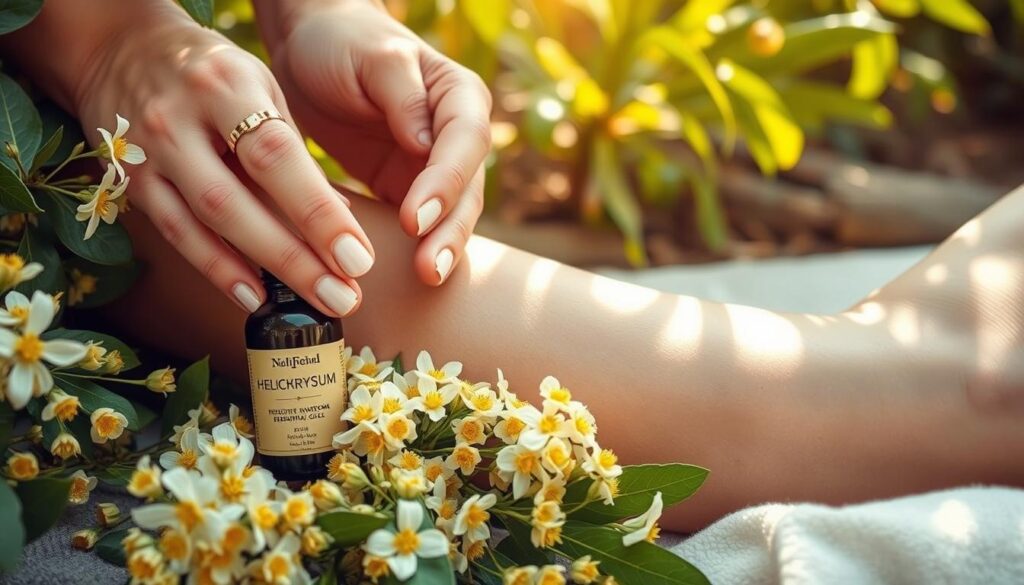Could a rare essential oil be the answer to varicose veins? More people are looking for natural ways to improve their health. Helichrysum essential oil is getting attention for its benefits on vein health. But what makes this oil special, and how can it help your legs look healthier and younger?
Key Takeaways
- Helichrysum essential oil is known for its anti-inflammatory and circulatory-boosting properties, making it a promising natural remedy for varicose veins.
- This rare and expensive oil is derived from a Mediterranean flower, with a limited global supply adding to its unique allure.
- Helichrysum oil is not a cure-all, but when used alongside other natural treatments and lifestyle changes, it can help alleviate varicose vein symptoms.
- Proper application and blending techniques are crucial to maximize the therapeutic benefits of helichrysum on vein health.
- Complementing helichrysum with other holistic ingredients can further enhance its effectiveness in addressing varicose veins.
Understanding Varicose Veins and Their Impact on Health
Varicose veins are a common circulatory issue that can affect your health and well-being. These veins become visible under the skin, looking twisted and discolored, usually in the legs. They can cause swelling, pain, and discomfort.
Common Symptoms and Causes
Varicose veins can make your legs ache, feel heavy, and tired. Standing for long periods, pregnancy, or a sedentary lifestyle can make it worse. Genetics, hormonal changes, and increased vein pressure can also play a role.
Why Natural Treatments Are Gaining Popularity
More people are choosing natural treatments for varicose veins. This is because they are less invasive and don’t have harsh side effects. Herbal medicine and aromatherapy are becoming popular for their gentle approach to treating varicose veins.
The Role of Holistic Medicine in Vein Health
Holistic medicine looks at the body, mind, and spirit for overall health. It focuses on supporting the circulatory system through lifestyle changes, diet, and herbal medicine. This approach aims to manage symptoms and improve vein health in the long run.
| Essential Oil | Potential Benefits for Varicose Veins |
|---|---|
| Helichrysum | Anti-inflammatory properties, beneficial for calming inflamed tissues and preventing the development of new varicose veins. |
| Cypress | Tightens tissues and promotes blood circulation. |
| Lemon | Promotes proper blood circulation and tightens blood vessel walls. |
| Rosemary | Can improve blood circulation and relieve pain when massaged on varicose veins. |
Essential oils can be used in different ways, like making compresses or adding to bathwater. But, it’s crucial to be careful and talk to a healthcare professional. Some oils can cause skin irritation or allergic reactions.
“Natural treatments are gaining popularity due to their minimal invasiveness and lack of harsh side effects.”
What Does Helichrysum Do for Varicose Veins?
Helichrysum essential oil is thought to help with varicose veins. It has anti-inflammatory properties that might lessen swelling and pain. It also boosts circulatory support, which is good for veins. Some people say it makes varicose veins look less noticeable and eases symptoms.
Essential oils, supplements, and natural remedies are popular for varicose vein relief. Lemongrass oil helps blood flow, stopping it from pooling in veins. Chamomile oil eases pain and discomfort, especially for those who stand a lot. Helichrysum oil has anti-inflammatory properties that fight blood clots and varicose veins, stopping new ones from forming.
Even though essential oils can help, they don’t get rid of varicose veins for good. Flavonoids, like grape seed extract, are plant-based supplements with antioxidants and anti-inflammatory properties. Daflon (MPFF) is a natural compound that helps with leg aching and swelling after a few months, backed by studies.
Essential oils like Lavender, Frankincense, Cypress, and Rosemary can also help with varicose vein symptoms. Geranium oil helps improve circulation, while Helichrysum oil boosts circulation and reduces inflammation. This might make varicose and spider veins less visible.
Varicose veins are more than just a cosmetic issue because of health risks like blood clots. Holistic methods like exercise, a healthy diet, and wearing compression stockings can help manage symptoms. But, they don’t treat varicose veins.
Scientific Evidence Behind Helichrysum’s Healing Properties
Recent studies show helichrysum essential oil has amazing healing powers, especially for varicose veins. It contains neryl acetate and gamma-curcumene, which are strong anti-inflammatory agents.
Active Compounds and Their Benefits
NCBI research proves helichrysum can calm inflamed tissues. It’s great for reducing inflammation in varicose veins. Applying helichrysum oil topically can lower inflammation markers, helping the circulatory system.
Research Studies and Clinical Findings
Varicose veins are more than just a cosmetic problem. They’re a sign of poor blood flow. Healthline notes natural remedies are becoming popular for treating varicose veins. They’re a gentle way to address the issue without harsh side effects.
Mechanism of Action on Vein Health
Helichrysum oil is known to improve blood flow through vascular dilation. This action helps alleviate symptoms and improves vein health.
| Compound | Therapeutic Benefit |
|---|---|
| Neryl acetate | Anti-inflammatory properties |
| Gamma-curcumene | Reduction in inflammatory markers |

“Helichrysum essential oil has been used in traditional folk medicine in regions where it grows for its anti-inflammatory, antifungal, and antibacterial properties.”
While lab and animal studies are promising, human research is still limited. Yet, the current evidence suggests helichrysum essential oil is a powerful tool against varicose veins and other health issues.
Proper Application Methods for Maximum Benefits
To get the most out of helichrysum essential oil for varicose veins, using the right application is key. It’s best to mix it with a carrier oil before applying it to the affected areas.
Start by blending a few drops of helichrysum oil with the same amount of a carrier oil like jojoba, coconut, or almond oil. Massage this mix into the varicose vein spots with upward strokes to help blood flow. Apply it twice a day, in the morning and evening, for the best results.
Don’t apply helichrysum oil straight to your skin without diluting it first. This can cause irritation. Mixing it with a carrier oil helps it absorb better and reduces the chance of skin problems. Also, do a patch test on a small skin area before using it regularly to check for any allergic reactions.
Adding other essential oils like lavender, cypress, or geranium to your treatment can also help. These oils are good for blood flow and reducing inflammation. But, always talk to a doctor before using essential oils, especially if you have health issues or are on medication.
| Essential Oil | Key Benefits for Varicose Veins |
|---|---|
| Lavender | Antioxidant and anti-inflammatory properties |
| Cypress | Tightens blood vessels and tissues, promotes circulation |
| Geranium | Strengthens aging veins, used in Traditional Chinese medicine |
| Lemon | Enhances blood circulation and tightens vessel walls |
| Ginger | Reduces discomfort from swollen skin and sore muscles, boosts circulation |
| Chamomile | Alleviates heaviness and discomfort, supports healthy blood constriction |
| Rosemary | Enhances blood circulation and reduces pain |

“Helichrysum-italicum essential oil has been noted by famed Italian scientist Leonardo Santini as effective for treating varicose veins.”
Complementary Natural Ingredients for Enhanced Results
Helichrysum essential oil can be even more effective when paired with other natural remedies. Adding complementary ingredients boosts the benefits and supports vein health.
Lavender essential oil is great for soothing and reducing inflammation. Mixing helichrysum with lavender can help lessen swelling and pain from varicose veins.
Cypress essential oil is also a good choice. It improves blood flow and strengthens veins. This can help make varicose veins less noticeable.
- Rosemary essential oil stimulates blood flow and improves vein function.
- Geranium essential oil promotes skin health and supports vein well-being.
Natural supplements can also help with vein health. Ingredients like horse chestnut seed extract, butcher’s broom root, and flavonoids have shown promise in managing varicose veins.
| Ingredient | Potential Benefits |
|---|---|
| Lavender Essential Oil | Soothing, anti-inflammatory |
| Cypress Essential Oil | Improves circulation, strengthens vascular system |
| Rosemary Essential Oil | Stimulates blood flow, improves vein function |
| Geranium Essential Oil | Promotes skin health, contributes to vein well-being |
| Horse Chestnut Seed Extract | Supports vein health and management of varicose veins |
| Butcher’s Broom Root | Helps improve circulation and vein function |
| Flavonoids | Possess anti-inflammatory and antioxidant properties that benefit vein health |
Using these natural remedies and herbal supplements with helichrysum essential oil can unlock natural solutions for varicose veins. It promotes overall vein health.
Conclusion
Helichrysum essential oil might help with varicose vein treatment, but it’s not a cure-all. It can ease symptoms and make varicose veins look better. Still, seeing a vascular specialist is best for full treatment.
Helichrysum oil is a natural way to tackle varicose veins, along with doctor’s advice. This mix can tackle the root causes, boost blood flow, and ease pain. It’s a smart way to manage this common vein issue.
Using helichrysum oil with a solid varicose vein treatment plan is key. This includes making lifestyle changes and getting medical help. Together, they offer the best way to handle varicose veins and keep veins healthy.

